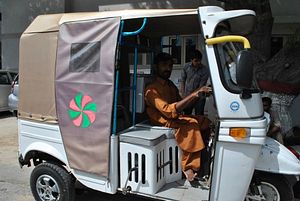Launched in 2012 by the Network of Organizations Working for People with Disabilities, Pakistan (NOWPDP), The Rickshaw Project (TRP) endeavors to give people with disabilities a second lease on life by gently integrating them into Pakistani society and making them economically empowered.
“It’s beneficial for us because along with a salary we are also taught a skill giving us a new way to earn independently through hard work, and also, sustaining our self-esteem,” said Siraj Bilal in an interview with a local channel, DAWN.
Bilal is one of three project drivers with physical disabilities who drive specially designed rickshaws as part of TRP. Originally from Swat, Bilal grew up in Karachi, where a bad road accident and a botched operation left him physically disabled. Bilal joined TRP two years ago and today works as a project driver and an in-house trainer.
The other two drivers, Imran Abdullah and Arshad Mehmood are polio survivors who participate in everything from the maintenance of the rickshaws to giving talks at educational institutions and corporations within Karachi. In fact, Mehmood used to work at a car workshop a few years ago that made retrofitted motorbikes for physically disabled users.
Even though they’ve started out small, TRP’s efforts seem to be a much-needed empathetic step in the right direction. While some studies estimate the number of people with disabilities in Pakistan at approximately 5 million, others quote a far higher number.
“A person with disabilities has had little to no representation in a national dialogue on the issues that continue to plague Pakistan as a nation – barring the 1981 Ordinance passed that sought to cosmetically address some of the issues,” stated Omair Ahmad, the Director of NOWPDP, in an article for DAWN’s daily newspaper. “Our architecture continues to be inaccessible, population unaware, policy framework inadequate and economic empowerment non-existent for people with disabilities.”
After an intensive interview and selection process, TRP’s project drivers under a rigorous three-month training period that covers everything from road training and traffic rules, to English training and basic disability training.
Also part of their small team is Zulqurnain Asghar, TRP’s Manager, who is the the first visually impaired clinical psychologist in South Asia. “He came on board in January 2014, given the breadth of his advocacy experience of the last 10 years, to further our mandate,” Ahmad told The Diplomat in an interview.
Ahmad candidly admits that even though the response to TRP has been encouraging, it hasn’t generated too many customers given the current size of the fleet. “The limited size of our fleet means we are very selective with our visibility so as not to be inundated by an influx of requests that will derail the project, which has contributed to us scaling the project slowly,” he said.
Even prior to the project’s launch, putting together specially designed rickshaws for disabled drivers was a challenge for the team. For one thing, it took over a year for TRP to find a vendor.
“Stahlco [the vendor] was willing to incorporate [Abdullah’s] design into a functioning model. A model we hope to further fine-tune and subsequently replicate,” stated Ahmad. “From a licensing perspective, the law is silent when it comes to commercial licensing as per the Motor Vehicle Ordinance of 1965 – so we focused on getting clearance from the Surgeon General of Sindh, which we secured, and were able to procure learning licenses. At the moment we are endeavoring to get converted into permanent commercial licenses by developing partnerships at the legislative and bureaucratic levels to bring about legal change.”
Currently targeting youth, TRP hopes to foster partnerships with colleges and corporations in Karachi. In addition, the team is focusing on expanding their fleet every few months to tap into a wider market. For now, customers can fill out an online form for rickshaw bookings in the city.
“Over the next 12-18 months, The Rickshaw Project platform will look to provide tangible and intangible changes from a legislative perspective in the areas of Transport and Mass Transit as well as Healthcare [in Pakistan], Ahmad stated, “Additionally, we want to initiate a call center and maintenance workshop manned by people with disabilities as well – inclusive of gender diversity – to continue on the path of economic empowerment.”
Sonya Rehman is a journalist based in Lahore, Pakistan. She can be reached at: sonjarehman [at] gmail.com




































